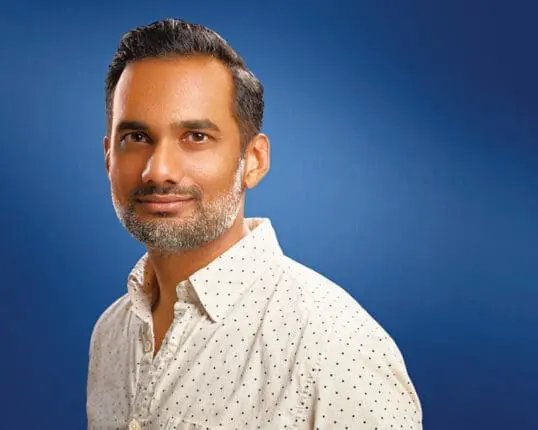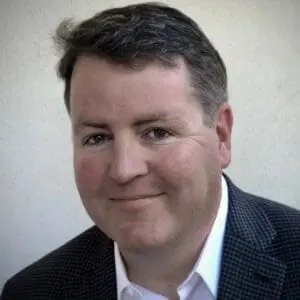We’re seeing more therapists use new media to reach wider audiences, cultivate public personas, and attract mass followings. Often their reach and popularity depend on a willingness to ditch the traditional clinical persona that many deem essential to establishing “expert” status.
Enter psychologist Ali Mattu. A disarmingly warm, plain-spoken, and self-disclosing California millennial, Mattu is a therapist who’s striking a chord as a bit of an influencer with younger audiences. A practitioner and former assistant professor of psychology at Columbia University, he became so frustrated with publicly available clinical content that he made a dramatic professional turn a few years ago.
He now devotes himself full-time to his YouTube channel, “The Psych Show,” posting upbeat, polished cuts of himself discussing mental health issues like trauma, motivation, sleep, stress, and empathy. These videos often get tens of thousands of views. And he gets personal. In one video, he acts out for his audience the differences between how he experiences anxiety and a panic attack. In others, he talks about how being a sci-fi fan gave his life direction and features his wife answering questions about what it’s like to be married to a therapist. And, crucially, he gives practical advice stripped of jargon.
After the success of “The Psych Show,” Mattu has had stints with Buzzfeed and appearances on Netflix’s series The Mind Explained. He’s cohosted PBS’s inspiring COVID series Self-Evident, and appears on A&E’s The Employables, which follows neuro-diverse people as they hunt for work.
A champion of making therapeutic principles mainstream, the passionate Mattu, who made a recent run for president of the American Psychological Association (APA), shares his personal story with us, and hints at a new big idea for educating and connecting with even wider audiences.
Ryan Howes: First, how are you doing? I know you’ve been open in your YouTube videos about your struggles during the pandemic and with the wildfires here in California.
Ali Mattu: I recently told someone that everyone now has a mental health story. They might not describe it in those terms, but everyone now understands the loneliness, isolation, grief, depression, and hypervigilance that we’ve long worked on in this field.
While I’m not currently practicing, a lot of former clients have reached out to me recently for booster sessions. Some are wrestling with new external realities. Some are struggling with the issues they always have, but in a more intense way. Some are simply reevaluating what’s meaningful in their life. There’s just no one way to experience this.
RH: You seem to be all over the internet these days. So much of psych messaging is therapists thinking they’re talking to other therapists, but you’ve garnered a really wide audience.
Mattu: The curse of having knowledge is that it’s hard to remember what it’s like not to know the things we know so well: what trauma is, or what depression is like. You and I and other therapists—and people who have mental health issues they’re working on—know these things intimately. But we have to be conscious about how we talk to the people who don’t. Part of why I feel compelled to share what I know with a general audience is my frustration with the lack of accessible, good-quality, jargon-free mental health information out there.
RH: You took an interesting path to getting such an audience. You almost failed out of high school before finding psychology in community college. What happened?
Mattu: My brother introduced me to science fiction growing up, and I loved it. I was obsessed with Star Trek, Planet of the Apes, Terminator—and with what these stories had to say about why humans do the things we do. They raised great questions of free will, cooperation, inhumanity, dystopias, and utopias.
What I was not obsessed with was being a good student. I didn’t do well in high school, but I knew I was going to have a fresh start at community college. Even then, I slacked off on registering for classes. I took “Intro to Psychology” because it was one of the few classes still open. The whole first hour was about busting myths about how the brain works, and I was immediately hooked. I had no idea there was going to be a connection in this material to the type of stories I’d loved all my life. I purchased the textbook for that class hours later, and I went home and started reading it. I’d never read ahead in a class before.
My wife, who was my girlfriend at the time, said, “Maybe you should major in this.” I remember telling her, “What the hell am I going to do with a psychology major?” She told me I’d figure it out, and she was right, of course. That conversation, along with a personal interest in learning about anxiety and depression, is what led me to become a clinical psychologist.
I don’t want to blame the education system for my almost flunking out of high school, but I went through periods of depression as a middle schooler and high schooler, and I wonder what would’ve happened if I’d been exposed to more of the kind of information I’m trying to share now. The good news is the landscape seems to be changing. For instance, New York State passed a law requiring all public schools to have a K-12 mental health curriculum.
People have been talking about psychology for thousands of years: they’ve always had opinions on thoughts, emotions, and behavior. But, as a science, it’s relatively new. We have this long history with a short past, and a lot of diverse perspectives that don’t often reach a consensus on specific problems. It’s a funky science. But as with the hard sciences, I hope we can move in the direction where people learn foundational ideas about psychology and mental health early in life. My family is originally from Pakistan, and I never felt comfortable talking about mental health and social issues until I started learning about psychology. It gives me a lot of hope that as a culture, we’re finally developing some of the muscles needed to have those conversations.
RH: Why did you begin producing free psych videos for YouTube?
Mattu: One day, a teenage girl I really enjoyed working with shared a video with me that she found helpful and motivating. But as I watched it, I grew enraged because the advice the teenager in the video was giving to thousands and thousands of other teens was not only bad, but could make their problems worse. So I told my client that I’d find her a better video on that topic, except none of the experts I knew were making short, digestible videos. They had a lot of lectures on YouTube, but my teenage client wasn’t going to watch an hour-long lecture.
I was complaining to my wife about this, and she said, “Well, you should make the video that you want her to be able to watch.” I thought it was a dumb idea. “You can’t just make a YouTube channel and put a video up,” I told her. And she just looked at me and said, “Ali, what do you think YouTube is?”
RH: You ran for APA president once. What was your message for the psychotherapists in the world?
Mattu: Everyone working in mental health has an area of expertise. We all have things we say routinely, over and over again, to the people we work with and the families we treat. We’re quite good at treating the handful of things that come our way. The problem is there’s a low ceiling to how many people can access that expertise, and that really frustrates me. It frustrates me that there’s only so many people we can treat in a week. I’m not saying I want us to be able to see more people, because that’s not sustainable for our own self-care, but I want to challenge other therapists to find ways to give away what they know and to share it with their communities.
That doesn’t mean go make a YouTube channel and learn how to make videos. In fact, I strongly don’t recommend that because it’s a lot of time and work. But what communities are you connected with? Do you attend religious services, help with your kids’ PTA, or take dance classes? Some of the people in those circles really need the same knowledge and experience that you share with your patients. The kind of things that we’re experts on—sleep, energy, stress, and mood—are the crises happening across the country. People are struggling with this stuff every single day. And sometimes just a little bit of your wisdom is enough to put someone on the right course.
We spend so much of our time working with outliers—people with diagnosable mental health conditions—that we ignore the fact there’s this subclinical population that’s really struggling. My call to action is, how can you find some way to give care to them? From personal experience, I can tell you that the more I give away, the more it gives back to me.
RH: There’s a new startup you’re involved in. Can you say anything about it yet?
Mattu: My wife got a job out here in Silicon Valley, and I took that opportunity to reboot my career by investing more in the media work I’m doing and exploring other ways to scale up mental health. So I’ve transitioned away from psychotherapy and joined a company that’s creating a product we hope is going to help a lot of people who are struggling with loneliness right now. We’re very early in this process, but our goal is to design a core peer-to-peer experience that’s forever free and layered with more personalized professional experiences. My job is to make sure our content is true to psychological science and effective in my experience as a therapist.
RH: Connecting people who are struggling can be a challenge because so many choose to turn inward at those times.
Mattu: That’s why I’m so open about sharing the stuff that I’ve gone through, the ups and downs. I wish I could share more stories from my clients, but they’re not mine to share. Still, I can address the issues widely, without jargon. This is how I can truly help.
Tell us what you think at letters@psychnetworker.org.
Ryan Howes
Ryan Howes, Ph.D., ABPP is a Pasadena, California-based psychologist, musician, and author of the “Mental Health Journal for Men.” Learn more at ryanhowes.net.













